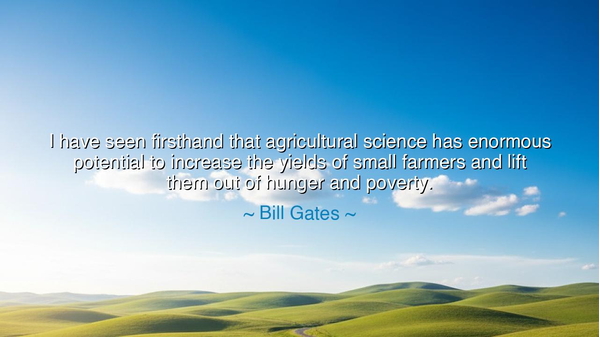
I have seen firsthand that agricultural science has enormous
I have seen firsthand that agricultural science has enormous potential to increase the yields of small farmers and lift them out of hunger and poverty.






"I have seen firsthand that agricultural science has enormous potential to increase the yields of small farmers and lift them out of hunger and poverty." These words, spoken by Bill Gates, carry a profound message for all generations—especially those who seek to improve the world through knowledge and innovation. They remind us that, in the vast expanse of human endeavor, there exists a powerful force capable of transforming the lives of the most vulnerable. Agricultural science, when harnessed wisely, holds the key to alleviating suffering, addressing hunger, and raising communities from the depths of poverty. But it is not simply about planting seeds in the soil; it is about planting the seeds of hope, opportunity, and change.
In the ancient world, the people lived by the rhythms of the earth. The farmers were the backbone of society, their toil in the fields the source of life for all. But even in those times, there was an understanding that agriculture, the very act of cultivating the land, could be a mystery—an art as much as a science. The ancient Egyptians, who built the great pyramids along the banks of the Nile, understood the importance of irrigation, harnessing the floodwaters of the river to grow their crops and sustain their civilization. Their innovations, although rudimentary by modern standards, laid the foundation for agricultural progress. As Gates points out, the potential of agriculture to uplift societies has always been apparent, but it is through science that we unlock its fullest power.
Consider the Green Revolution of the 20th century, a time when the world witnessed a great transformation in agriculture. Pioneering scientists like Norman Borlaug worked tirelessly to develop high-yielding crop varieties, accompanied by advanced agricultural techniques, fertilizers, and pesticides. This revolution did not merely increase food production; it saved countless lives. In nations like India and Mexico, where hunger and famine were once rampant, agricultural science turned barren land into fields of abundance. Borlaug, often called the "father of the Green Revolution," saw firsthand how the right application of science could pull entire populations from the brink of starvation, just as Gates has witnessed in his own work with small farmers.
Gates’s words are a call to action—a reminder that the work begun by Borlaug and others is far from finished. There are still many regions of the world where small farmers struggle against the forces of nature, economic hardship, and climate change. Yet the potential for change remains boundless. Agricultural science, through the use of new technologies like genetically modified organisms (GMOs), precision agriculture, and sustainable farming practices, can continue to provide solutions that not only increase yields but do so in a way that protects the environment and ensures food security for generations to come. The lesson from history is clear: the application of science has the power to not only improve crop yields but also to transform lives.
Imagine the story of the smallholder farmer in sub-Saharan Africa. For generations, they have worked tirelessly, often with minimal resources, to grow enough food to feed their families. Despite their hard work, the yields are often low, and poverty remains entrenched. But when they are equipped with the tools of modern agricultural science—better seeds, irrigation systems, and knowledge of sustainable farming techniques—miracles begin to happen. Their fields flourish, their families are nourished, and they are lifted out of poverty. This transformation does not occur overnight, but it is driven by the scientific knowledge that empowers farmers to grow more food, increase their income, and break free from hunger.
The lesson to take from Bill Gates's words is one of hope, action, and empowerment. We are not powerless in the face of hunger or poverty. Through innovation, education, and access to technology, we can help the world’s poorest rise above their circumstances. It is the responsibility of those with the means to bring these solutions to those in need, to ensure that agricultural science is not just a tool for the rich but for the poor, for the small farmers who often feed the world’s most vulnerable populations. The work of the past century has proven that change is possible, but it is up to each of us to continue that work, to spread the knowledge, and to bring sustainable agriculture to all corners of the earth.
So, let us all consider how we might contribute to this noble cause. Perhaps it is through supporting innovations in agricultural technology, advocating for policies that promote sustainable farming, or investing in education for smallholder farmers. Whatever the path, the lesson is clear: the science of agriculture is a force for good—a force capable of breaking the chains of hunger and poverty, and building a better tomorrow for all of humankind. Let us commit to that vision and work together to bring it to fruition.






AAdministratorAdministrator
Welcome, honored guests. Please leave a comment, we will respond soon